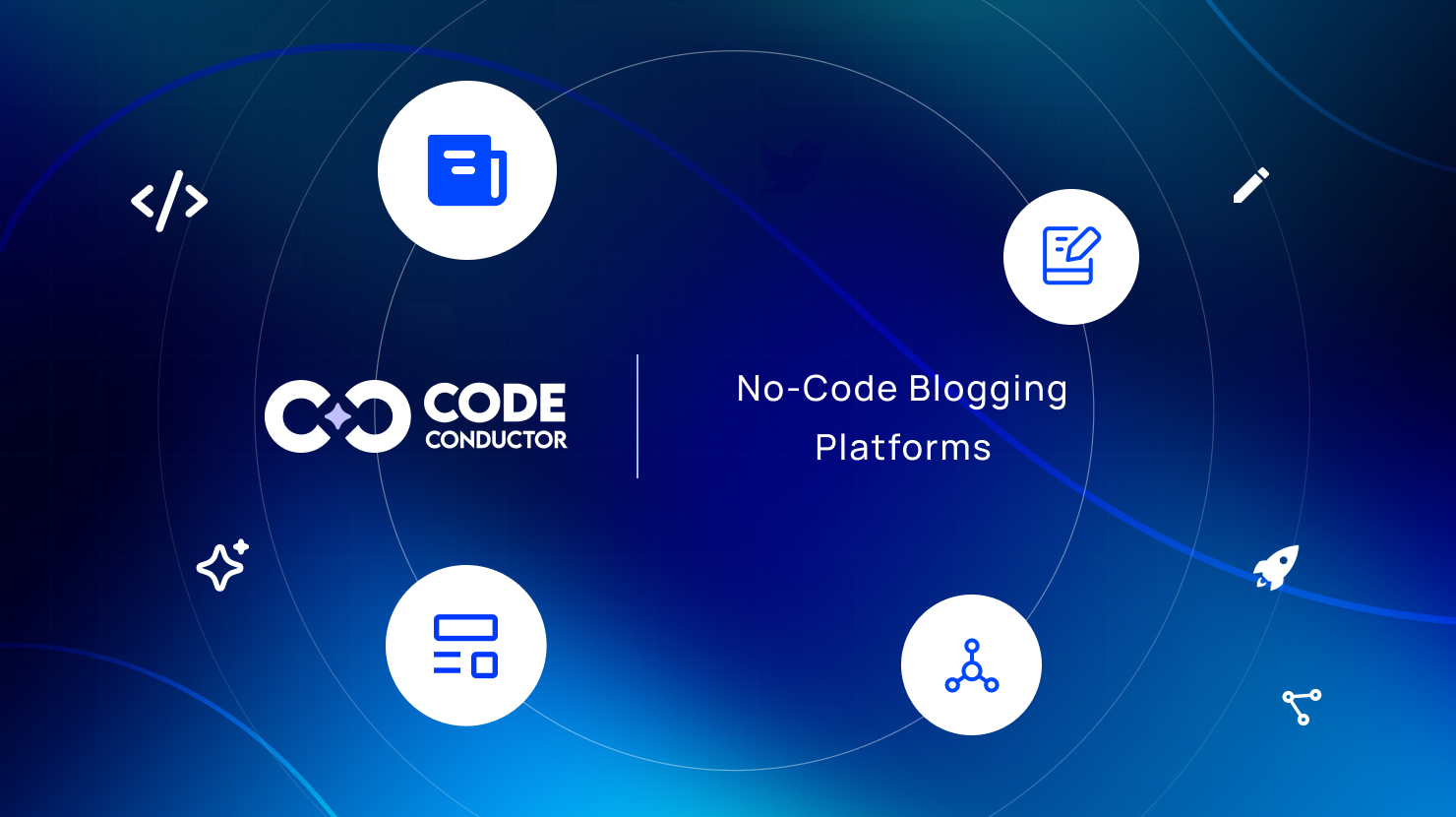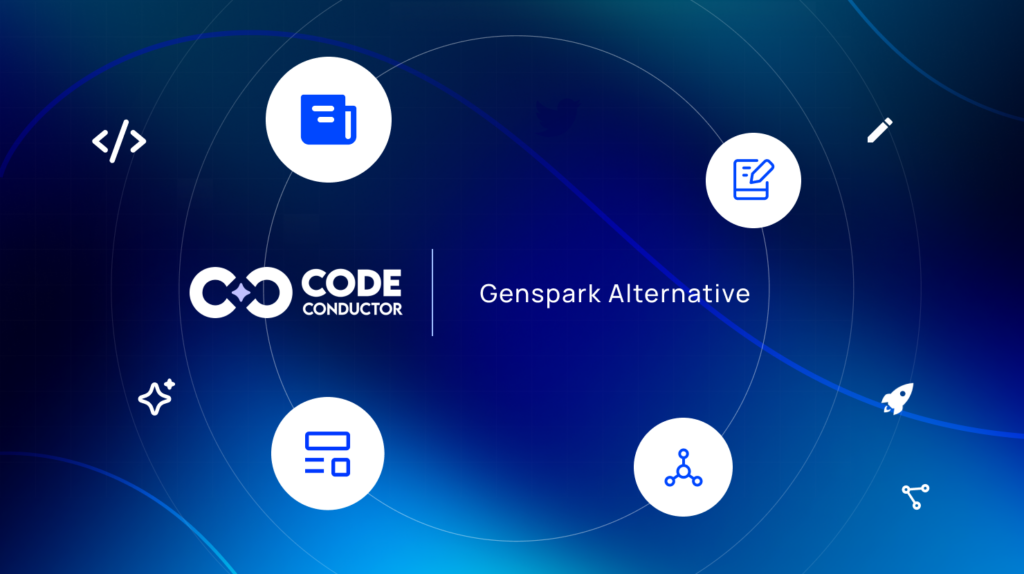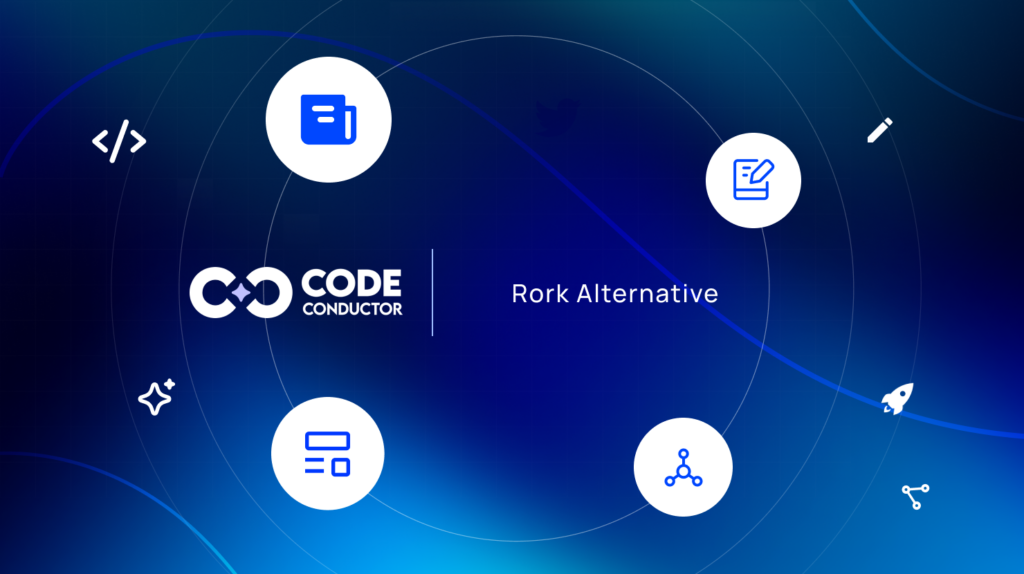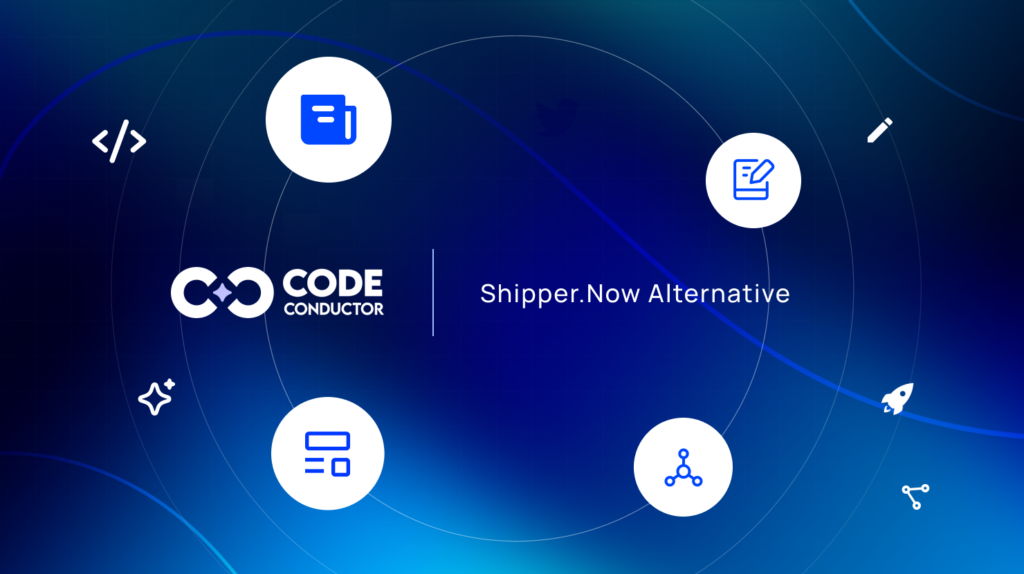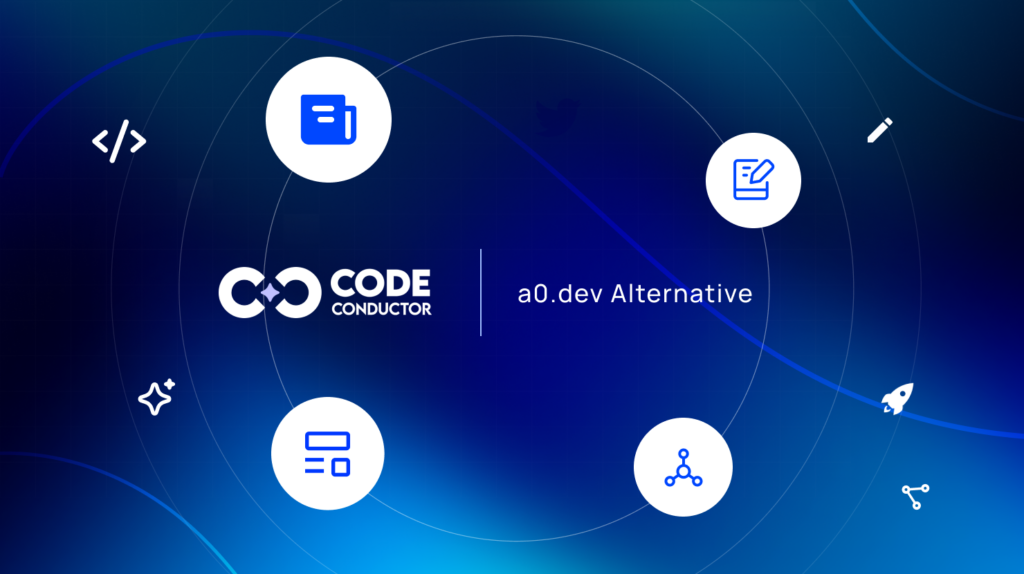These days, making money by sharing the things you’re passionate about has never been simpler. People are tapping into their hobbies, skills, and unique areas of expertise to create engaging videos, blog posts, and other online content. The key driver behind this trend is the emergence of user-friendly, no-code blogging platforms.
These innovative tools have made it incredibly easy for anyone to become a successful blogger, without requiring them to possess any technical coding knowledge whatsoever.
Plenty of free no-code blogging platforms help bloggers to build blog websites without altering the code manually. These platforms often come with templates or themes that you can customize and try for blogging without any financial commitment. Such user-friendly platforms offer a seamless and intuitive experience, allowing you to focus on what truly matters: crafting compelling content and engaging with your audience.
From visually stunning templates to built-in SEO tools, no-code blogging platforms have everything you need to create a professional-looking and highly functional blog without breaking a sweat.
Whether you’re looking to share personal stories, discuss your passions, or provide expert insights, these no-code blogging platforms can serve as an excellent starting point for your blogging journey.
In this blog post, we will explore the best no-code blogging platforms to create a blog website that can help streamline your web development process.
What Are No-Code Blogging Platforms?
No-code blogging platforms are website-building tools that allow anyone to create and run a blog without requiring any coding skills. With a no-code platform, you simply use visual editor features to build your blog’s layout, design, and structure. In simple terms, the platform handles all the technical website stuff behind the scenes.
These platforms come pre-loaded with blog templates you can customize with your own branding, colors, fonts, etc. They also have built-in blogging features like publishing, categories, tags, comments, and more at the click of a button.
The biggest advantage of no-code blog builders is how accessible they make blogging. Whether you’re a writer, small business, hobbyist, or just someone with thoughts to share, you can get a professional-looking blog up and running in no time without hiring a developer or learning complex skills.
No-code blogging revolutionizes who can become a creator on the internet. With these simple but powerful tools, blogging is open to absolutely everyone regardless of technical ability.
All you need is the desire to start writing!
Top No-Code Blogging Platforms
Now that we understand what no-code blogging platforms are, let’s dive into some of the most popular options available:
1. CodeConductor
CodeConductor is an AI-powered no-code website builder that has completely changed the blogging experience.
Designed with bloggers in mind, this platform offers a comprehensive suite of features to help you create a visually stunning, SEO-optimized blog without any coding knowledge.
One of the standout features of CodeConductor is its AI-powered blog optimization capabilities. This cutting-edge technology analyzes your content and automatically optimizes it for search engines, ensuring maximum visibility and discoverability for your blog posts. Additionally, CodeConductor provides free SSL certification for all blogs, ensuring a secure and trustworthy online presence for your readers.
Customization is key with CodeConductor, as the platform offers a vast collection of premium AI-optimized templates tailored specifically for blogging. Also, CodeConductor provides access to a vast library of free images and videos, allowing you to enhance your blog posts with engaging multimedia content.
Benefits:
- AI-powered optimization: Makes your blog posts more discoverable in search engines.
- Free SSL certification: Ensures a secure and trusted experience for your readers.
- Beautiful blog templates: Choose from a variety of pre-designed, SEO-friendly options.
- Free stock media library: Add images and videos to your blog without breaking the bank.
2. Wix
Wix is a pioneering no-code website builder that has made its mark in the blogging world. It offers a user-friendly interface, enabling bloggers to create visually appealing and feature-rich blogs without any coding knowledge.
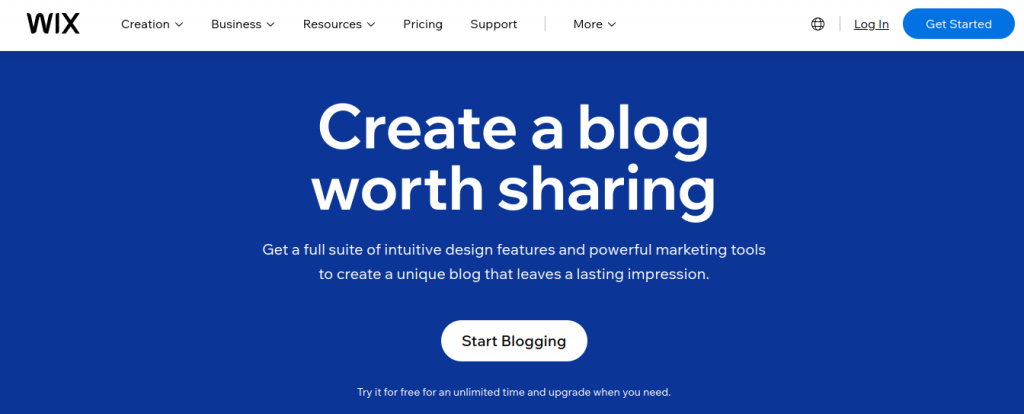
Wix provides a vast array of design options, allowing users to personalize their blog’s appearance and layout to match their unique style and brand. One of the key advantages of using Wix for blogging is its seamless integration with social media platforms.
Bloggers can effortlessly share their content across various social channels, expanding their reach and connecting with a broader audience. Furthermore, Wix offers robust SEO tools, ensuring that your blog posts are optimized for search engines and easily discoverable by potential readers.
Benefits:
- Drag-and-drop simplicity: Build your blog with a user-friendly interface, no coding required.
- Wide range of apps and integrations: Extend your blog’s functionality with tools for marketing, analytics, and more.
- Free plan available: Get started with Wix for free to test the waters before upgrading.
3. WordPress
WordPress is a no-code blogging solution that has gained immense popularity among bloggers of all levels. It doesn’t require any technical expertise or coding knowledge which makes it an accessible choice for anyone looking to start a blog.

With a vast community of users and an extensive library of plugins and themes, WordPress offers unparalleled customization options.
Bloggers can enhance their blog’s functionality and appearance with just a few clicks, tailoring it to their specific needs and preferences. Moreover, WordPress provides robust content management tools, allowing bloggers to easily organize, categorize, and schedule their posts.
Benefits:
- Unmatched flexibility: Vast library of plugins and themes allow for a highly customized blog.
- Open-source platform: Offers greater ownership and control compared to some hosted options.
- Large and supportive community: Find help and inspiration from a network of experienced WordPress users.
4. Medium
Medium is a minimalistic and distraction-free no-code blogging platform that focuses on quality content and storytelling. With Medium, writers can focus on writing compelling narratives without worrying about complex design elements or coding requirements.
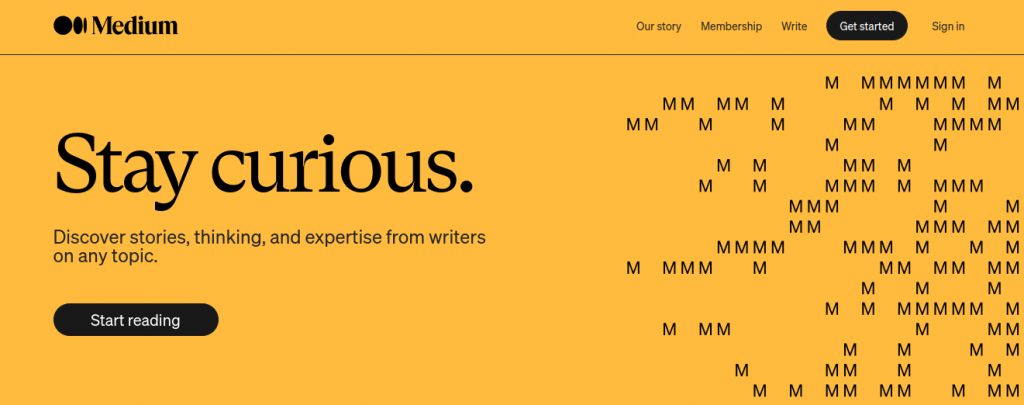
One of the key advantages of using Medium is its built-in audience. By publishing on this platform, bloggers gain access to a diverse community of readers, increasing their chances of discoverability and engagement.
Additionally, Medium’s curated content system ensures that high-quality posts are surfaced and promoted, providing bloggers with increased visibility and exposure.
Benefits:
- Built-in audience: Gain exposure to a large existing audience on Medium’s platform.
- Simple and clean interface: Focus on writing without worrying about design or hosting.
- Potential for monetization: Earn money through the Medium Partner Program based on reader engagement.
5. Squarespace
Squarespace is a no-code blogging platform that has gained a reputation for its stunning designs and sleek templates.
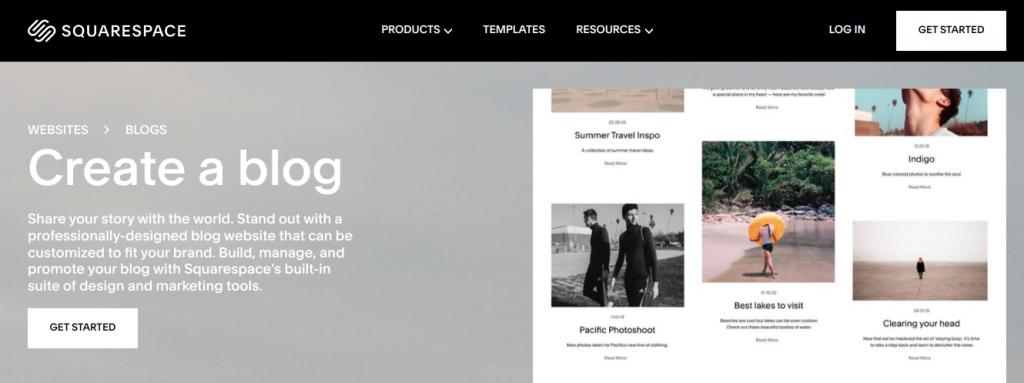
Whether you’re a lifestyle blogger, a photographer, or a small business owner, it offers a user-friendly solution for creating visually captivating blogs without any coding knowledge.
Did you know Which Is The Best Squarespace Alternative in 2026?
With its intuitive drag-and-drop editor and a wide range of customization options, Squarespace empowers bloggers to bring their unique visions to life.
From typography and color schemes to layout and multimedia integration, every aspect of your blog can be tailored to reflect your brand and personal style. Aside from this, Squarespace’s robust e-commerce capabilities make it an excellent choice for bloggers looking to monetize their content.
Benefits:
- Stunning design templates: Known for beautiful and easy-to-use website and blog layouts.
- All-in-one solution: Includes hosting, domain registration, and essential features for a professional blog.
- Ecommerce capabilities: Sell products directly through your blog if you have a business focus.
6. Weebly
Weebly is a no-code blogging platform that prioritizes simplicity and ease of use. With its drag-and-drop editor and user-friendly interface, even beginners can set up a professional-looking blog in no time.

Weebly’s streamlined approach makes it an excellent choice for those seeking a no-frills, straightforward blogging experience. One of the standout features of Weebly is its mobile responsiveness. All blogs created on this platform are automatically optimized for viewing on various devices, ensuring a seamless experience for your readers regardless of their screen size.
Besides, Weebly offers a range of blogging tools and features, such as commenting systems, social media integration, and analytics. These further help the bloggers to engage with their audience and track their blog’s performance.
Benefits:
- Affordable pricing: Offers basic and premium plans for budgets of all sizes.
- Easy mobile editing: Manage your blog on the go with a user-friendly mobile app.
- Marketing tools included: Promote your blog through built-in SEO tools and social media integration.
7. Webflow
Webflow is a no-code platform that offers greater customization and design flexibility for bloggers who seek a more advanced solution. Despite its steep learning curve, Webflow empowers users to create truly unique and visually stunning blogs without sacrificing functionality.

With its powerful design tools and responsive canvas, Webflow allows bloggers to craft pixel-perfect layouts and intricate designs, ensuring their blog stands out from the crowd. As well, Webflow offers robust content management capabilities, making it easy to organize and publish blog posts with ease.
For bloggers seeking a no-code solution that combines design prowess with content management, Webflow is an excellent choice. Check Best Webflow Alternative to Build Website & Mobile Apps.
Benefits:
- Design freedom for creatives: Offers more design flexibility compared to some drag-and-drop platforms.
- Clean code generation: Ensures your blog is built with well-structured code for optimal performance.
- Advanced features: Ideal for bloggers looking for more customization options beyond basic layouts.
Final Thoughts!
Nowadays, where content is king, the ability to share your thoughts, experiences, and expertise with the world has become more accessible than ever before. No-code blogging platforms have truly simplified the blogging experience, breaking down the barriers that once limited content creation.
With a vast array of features, no-code blogging platforms have made it possible for anyone to craft visually stunning, engaging, and SEO-optimized blogs.
With no-code blogging platforms, individuals can focus on what matters most – crafting compelling content and connecting with their audience – without worrying about technical complexities. And, the advancements of AI make it easy to get more sophisticated and user-friendly solutions for content creators.
Want to start your own blog? Try CodeConductor today! The best AI powered Software development planform. Because the world is waiting to hear your story – start writing today!
FAQs:
Do I need to learn coding to start a blog website?
No, you do not need to learn coding or have any technical skills to start a blog website when using no-code blogging platforms. These platforms are specifically designed to be user-friendly and allow anyone to create a professional-looking blog without writing a single line of code. All the web development and coding happens behind the scenes. No-code platforms simplify creating dropshipping websites, allowing anyone to start without coding expertise.
Which no-code blogging platform is best for beginners?
For beginners looking to start their first blog, there are many no-code blogging platforms CodeConductor, Wix, Weebly, WordPress, Medium, Squarespace. These tools are very intuitive editors that make the blogging setup process simple.
Which no-code blog platforms are the most SEO-friendly?
Platforms like CodeConductor, WordPress, and Squarespace tend to be the best no-code options for SEO. They offer built-in SEO tools, optimized templates, mobile responsiveness, and other search engine optimization features to help your blog get discovered more easily online.
What are the benefits of using no-code blogging platforms?
The main benefits of no-code blogging platforms are accessibility, ease of use, affordability, and speed. These platforms allow anyone to quickly create a modern blog without learning complex skills. Even these are very cost-effective as most have free plan options. And you can have a fully functioning blog up and published in no time without any coding required.

Founder CodeConductor

